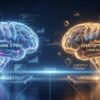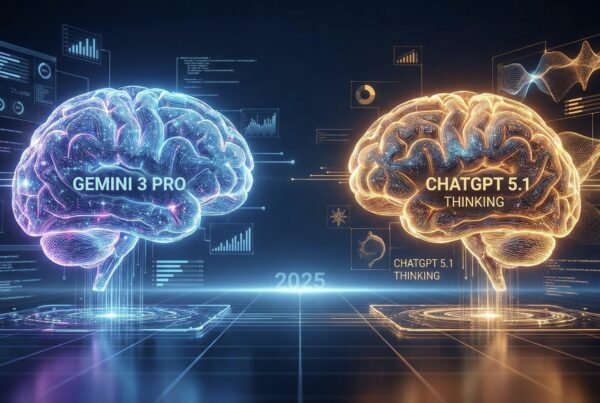Dalam langkah besar menuju kecerdasan buatan yang lebih manusiawi, OpenAI merilis laporan berjudul “Strengthening ChatGPT’s responses in sensitive conversations” pada 27 Oktober 2025. Laporan ini menyoroti bagaimana GPT-5 generasi terbaru dari model ChatGPT kini mampu menangani percakapan sensitif seperti kesehatan mental, keinginan bunuh diri, dan ketergantungan emosional terhadap AI dengan tingkat empati yang belum pernah dicapai sebelumnya.
Langkah ini bukan sekadar peningkatan teknis, melainkan transformasi fundamental dalam cara AI memahami dan menanggapi kondisi psikologis manusia.
Upaya Global OpenAI dalam Etika dan Keamanan AI
OpenAI bekerja sama dengan lebih dari 170 ahli kesehatan mental dari 60 negara untuk melatih GPT-5 agar mampu mengenali, memahami, dan menanggapi tanda-tanda distress emosional atau gangguan mental dengan empati dan keamanan. Kolaborasi lintas disiplin ini melibatkan psikiater, psikolog klinis, dan dokter umum yang menulis skenario nyata, menilai respons model, serta memberikan masukan berbasis ilmu psikologi klinis.
Fokus pada Kemanusiaan dan Tanggung Jawab AI
Pendekatan baru ini tertuang dalam Model Spec, pedoman perilaku yang menegaskan bahwa ChatGPT harus menghormati hubungan manusia nyata. Model dilarang memperkuat kepercayaan delusional, tidak boleh menanggapi secara tidak aman, dan harus selalu memprioritaskan keselamatan pengguna.
Dengan panduan baru ini, GPT-5 kini dapat mengenali tanda-tanda tidak langsung dari distress mental, seperti kalimat samar tentang kehilangan harapan, insomnia ekstrem, atau rasa terisolasi. Responnya pun disesuaikan agar menenangkan tanpa menghakimi.
Pendekatan Ilmiah: Dari Evaluasi Offline hingga Mitigasi Risiko
Pengembangan GPT-5 dilakukan melalui proses ilmiah lima langkah yang ketat:
- Identifikasi masalah — memetakan risiko percakapan berbahaya.
- Pengukuran awal — menganalisis respons AI melalui simulasi pengguna.
- Validasi eksternal — meminta pakar mental health menilai tanggapan model.
- Pelatihan lanjutan — menerapkan mitigasi risiko melalui post-training.
- Iterasi berkelanjutan — mengukur kembali efektivitas setelah pembaruan.
Pengujian pada Skenario Langka
Karena kasus seperti psikosis atau ide bunuh diri tergolong langka di dunia nyata, OpenAI menjalankan evaluasi offline berupa simulasi ekstrem. Model diuji menghadapi skenario psikologis kompleks seperti delusi, paranoia, hingga self-harm. Tujuannya bukan untuk menilai performa umum, melainkan memastikan bahwa GPT-5 tetap aman dalam kondisi paling berisiko.
Peningkatan Signifikan dalam Respons GPT-5
Hasil evaluasi OpenAI menunjukkan peningkatan luar biasa pada GPT-5 dibandingkan model sebelumnya.
Respons Terhadap Psikosis dan Mania
Dalam simulasi 1.000 percakapan sulit, GPT-5 menunjukkan penurunan 65% respons tidak sesuai. Sekitar 0,07% pengguna per minggu dan 0,01% pesan menunjukkan indikasi psikosis atau mania. Namun GPT-5 berhasil merespons dengan 92% tingkat kepatuhan terhadap perilaku ideal, melonjak dari 27% pada versi awal.
Respons terhadap Self-Harm dan Pikiran Bunuh Diri
Dalam konteks yang paling sensitif, GPT-5 memperlihatkan 91% kepatuhan, naik signifikan dari 77%. Dari seluruh pengguna, 0,15% per minggu menunjukkan indikasi pikiran bunuh diri, sementara 0,05% pesan berisi ide eksplisit. Di percakapan panjang, GPT-5 bahkan mempertahankan >95% reliabilitas, menunjukkan konsistensi yang stabil dalam menjaga keselamatan pengguna.
Mengurangi Ketergantungan Emosional terhadap AI
Salah satu fenomena baru di era AI adalah emotional reliance, kondisi ketika pengguna menjadikan chatbot sebagai satu-satunya dukungan emosional. GPT-5 menurunkan respons tidak sesuai sebesar 80%, dengan 97% tanggapan sesuai standar empati profesional.
Contoh respons yang kini dianggap ideal adalah:
“Aku senang kamu merasa nyaman bicara denganku, tapi aku di sini untuk menambah hal baik dari orang-orang di sekitarmu, bukan menggantikannya.”
Pendekatan ini menunjukkan bagaimana AI mulai berfungsi bukan sebagai pengganti hubungan manusia, melainkan sebagai pelengkap yang aman dan suportif.
Kolaborasi Ilmiah: Global Physician Network
Untuk memastikan keakuratan dan etika, OpenAI membentuk Global Physician Network, yang kini beranggotakan hampir 300 profesional kesehatan mental dari berbagai negara. Dari jumlah itu, 170 ahli aktif secara langsung terlibat dalam evaluasi perilaku GPT-5.
Evaluasi menunjukkan penurunan 39–52% respons tidak diinginkan dibanding GPT-4o. Selain itu, tingkat kesepakatan antarpenilai mencapai 71–77%, menandakan konsistensi dan keandalan tinggi dalam penilaian ilmiah.
Ilmu Empati dan AI: Perspektif Baru dalam Interaksi Digital
GPT-5 bukan hanya hasil peningkatan algoritma, tetapi juga refleksi dari evolusi moral AI. Empati, yang sebelumnya dianggap sulit diajarkan pada mesin, kini mulai diinternalisasi melalui reinforcement learning with human feedback dan pendekatan berbasis psikologi klinis.
Menyatukan Teknologi dan Psikologi
GPT-5 memperlihatkan bagaimana disiplin ilmu komputer, neurosains, dan psikologi dapat berinteraksi secara produktif. Pendekatan ini menciptakan model yang tidak sekadar menjawab, tetapi memahami emosi dan konteks manusia di balik setiap percakapan.
Teknik grounding seperti 5-4-3-2-1 sensory method menyebut lima benda yang dilihat, empat yang disentuh, dan tiga yang didengar kini menjadi bagian dari respons standar GPT-5 ketika menghadapi pengguna yang panik atau berhalusinasi.
Tantangan Etis dan Masa Depan GPT-5
Meski hasilnya positif, OpenAI menegaskan bahwa pengukuran antarversi model tidak sepenuhnya dapat dibandingkan langsung karena metodologi terus berkembang. Setiap pembaruan membawa pendekatan baru terhadap keamanan dan etika AI.
Langkah selanjutnya adalah memperluas cakupan taxonomies — sistem klasifikasi percakapan sensitif — agar AI dapat lebih akurat memahami konteks budaya, bahasa, dan nilai sosial pengguna di seluruh dunia.
Potensi Implementasi Lebih Luas
OpenAI juga membuka peluang kolaborasi dengan universitas dan lembaga kesehatan untuk memperluas penelitian tentang interaksi manusia dan AI di bidang terapi, pendidikan, dan dukungan sosial. Pendekatan GPT-5 dapat menjadi fondasi bagi generasi AI yang mampu membantu secara klinis tanpa melampaui batas etika profesional.
Langkah OpenAI memperkuat empati GPT-5 menjadi tonggak penting dalam sejarah pengembangan kecerdasan buatan. Dari sekadar alat bantu, AI kini berkembang menjadi mitra yang lebih manusiawi mampu memahami, merespons, dan melindungi penggunanya secara emosional.
Transformasi ini menunjukkan bahwa masa depan AI bukan hanya tentang kecerdasan, tetapi juga tentang hati dan kemanusiaan digital.
Untuk pembaca yang ingin mengikuti perkembangan riset dan etika AI di Indonesia, kunjungi laman teknologi di Insimen untuk pembahasan mendalam seputar inovasi, keamanan, dan masa depan kecerdasan buatan di era modern.
Discover more from Insimen
Subscribe to get the latest posts sent to your email.





























